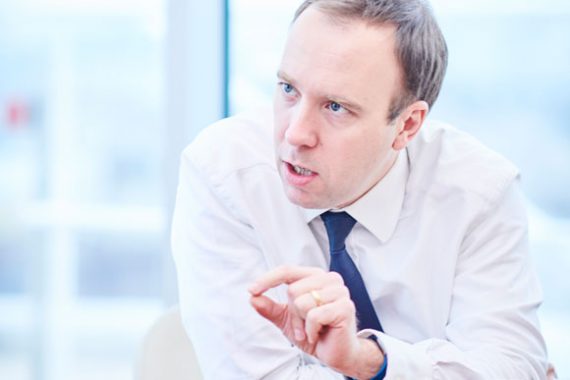Conservatives pledge 6,000 new doctors in general practice by 2024/25

The Conservative Party has pledged to create 50 million more GP appointments a year by 6,000 new doctors to general practice by 2024/25, health secretary Matt Hancock has announced.
The 6,000 doctors will include 3,000 extra fully qualified GPs and 3,000 trainees, who will be spending longer training in general practice that they do currently.
Mr Hancock has pledged to invest £2.5 billion over four years to increase the number of NHS staff, improve international recruitment and retention of domestic staff, and train 500 more GPs a year.
He also pledged £300m a year to increase the number of non-GP healthcare staff in general practice by an extra 6,000 on top of the 20,000 pledged as part of the GP contract, which will include nurses, physios and pharmacists.
Mr Hancock said: ‘I love our NHS and am incredibly proud of the world-class care it offers patients. We all know that prevention is better than cure – and our GPs are at their heart the best way of helping us all stay out of hospital. I know that it is too often difficult to book an appointment with a GP. We all know the feeling of ringing a GP surgery first thing in the morning, holding on to get an appointment.
‘We recognise our GPs are under increasing pressure, so we will put record funding into our GP surgeries, and to help everyone get the care they need. We will create 50 million extra appointments in GP surgeries each year, with the sort of easy online booking that we expect in other areas of our lives.’
Former health secretary Jeremy Hunt made a pledge in 2015 to increase the GP workforce by 5,000 by 2020. However, since then, the number of GPs has decreased.
Shadow health secretary Jonathan Ashworth said: ‘No one will believe the failing health secretary. They always make election promises which they fail to deliver on. Indeed Tory ministers promised us 5,000 extra GPs and in fact GP numbers have been falling under the Tories.
’After years of starving the NHS of cash, it’s got harder and harder to get a GP appointment under this government.
’Labour will invest more in primary care and train more family doctors to deliver millions of extra GP appointments.’
BMA GP committee chair Dr Richard Vautrey said: ’The ongoing workforce crisis means patients are waiting far too long for appointments and GPs remain under intolerable pressure to be able to provide safe and sustained care. The Conservative’s commitments to deliver more GPs through additional training places is therefore encouraging. However, a previous Conservative pledge to deliver 5,000 GPs by 2020 has fallen way short of its target, and the number of GPs we have has continued to dwindle. So, we wait with some trepidation to see if this latest promise can deliver.
’The promise to also address the problem of stopping GPs leaving the profession is also welcome, though there is still much work to be done to improve this situation with punitive pension regulations, inadequate premises, archaic IT systems and overly burdensome admin still proving a serious barrier to doctors choosing and remaining in general practice.’
He added: ’The lack of detail as to exactly how all these promises will be made good, particularly with no firm commitment for full reform of the ridiculous pension taxation system, means it remains to be seen whether these long overdue and very necessary improvements will be achieved.’
Richard Murray, chief executive of The King’s Fund, said: ‘The latest GP Patient Survey shows that once people can get into their local surgery their experience is overwhelmingly positive but for many getting an appointment in the first place is the problem. These new commitments to improve capacity and access in general practice are welcome but the success of these measures will hinge on the ability to recruit and – more importantly – retain enough GPs and professionals such as physiotherapists and pharmacists.
‘The volume and intensity of GP workloads is driving many to either reduce their hours or leave the profession altogether. While more GPs than ever are being trained, overall GP numbers are falling, with six per cent fewer full time equivalent GPs in September 2018 than in 2015.’












